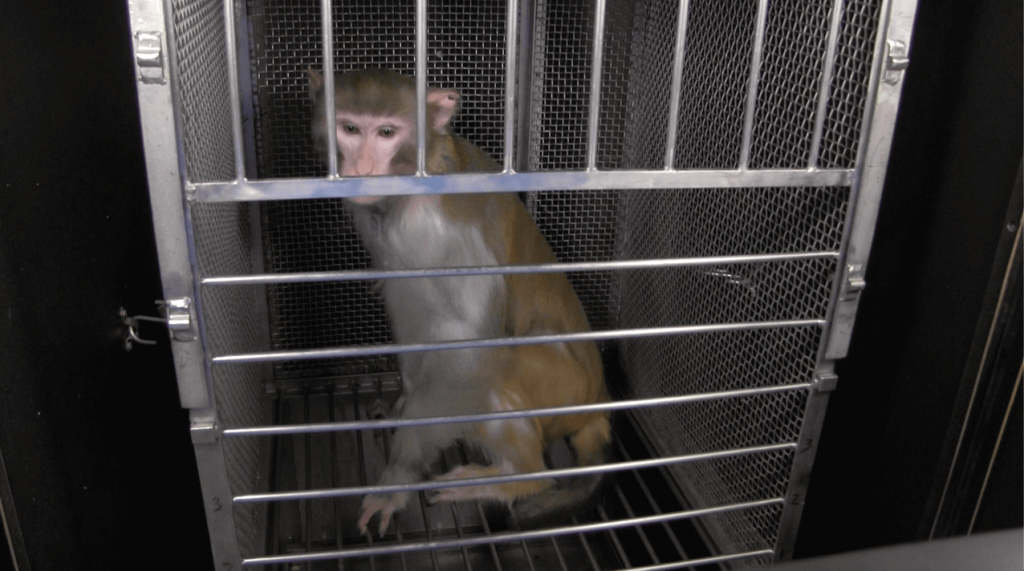Dozens of animals are dead and many more are injured due to blatant negligence and incompetence in U.S. Food and Drug Administration (FDA) laboratories, according to federal documents obtained by PETA.
The reports detail a laundry list of violent acts committed against animals, including the suffocation death of a hamster, the starvation death of a rat, and multiple monkey escapes that led to finger and toe amputations.
In light of these obscene violations and the documented ineffectiveness of animal experimentation, PETA is urging the FDA to transition to non-animal, human-relevant research methods.
FDA: Flagrant Disregard for Animals
Not only did the documented incidents directly violate multiple federal animal welfare guidelines, they were also utterly preventable. An inability to adhere to even the bare minimum animal care standards led to the extreme suffering of dogs, fish, frogs, and other animals.
The horrors took place at three laboratories operated by the FDA: the Center for Veterinary Medicine in Laurel, Maryland; the National Center for Toxicological Research in Jefferson, Arkansas; and the White Oak Consolidated Animal Program in Silver Spring, Maryland.
The violations include the following:
Fourteen zebrafish died after inattentive staff failed to notice that equipment had malfunctioned, changing the water quality in their tanks.
A rat sustained a deep wound that exposed muscle after staff put the animal in the wrong cage with an incompatible rat, causing the two to fight.
One rat died and a second one nearly died of starvation after a caretaker failed to provide food. Another rat died and three others became severely sick after experimenters gave them a carcinogenic chemical.
Three frogs died after eating unsuitable plastic aquarium plants.
One hamster suffocated to death after staff moved the animal’s cage to an inadequately ventilated area, and a second hamster died after staff incorrectly set up an anesthesia system. In another incident, a hamster died and another was unresponsive after staff mishandled cage equipment.
Two rabbits sustained cuts that required stitches after the divider between their cages was moved, causing them to fight.
Monkeys escaped from their cages on two separate occasions. In one incident, staff failed to secure a cage lock, allowing monkeys to escape and fight with other monkeys. Five monkeys sustained bite wounds to their hands, feet, and tongues, requiring that some of their fingers and toes be amputated.
Seven mice died and five others were in critical condition after staff failed to evaluate the animals and provide care. Four other mice didn’t receive necessary veterinary treatment for three full days. Three additional mice died shortly after arriving at the FDA facility.
Three dogs sustained injuries after catching their paws on exposed wire in a faulty cage.
Experimenters also went rogue on multiple occasions, ignoring what they were approved to do to animals. For example, 13 mice and their babies were used in an experiment approved for only eight mice and their babies. Several mouse pups fell victim to cannibalism as a result of severe crowding and stress stemming from this error.
Animals Don’t Belong in Labs
As the agency responsible for ensuring the safety of the food and medicine we rely on, the FDA should invest its resources—more than $6.7 billion in taxpayer money in 2023 alone—only in the most reliable research available. These practices are outlined in PETA scientists’ Research Modernization Deal, which provides a comprehensive strategy for replacing all animal experiments with more effective, human-relevant, non-animal methods.
The FDA itself has voiced support for adopting non-animal testing methods, so there’s no reason for animals to still be imprisoned in its laboratories and no excuse for the lack of care these animals received.
What You Can Do
Please urge Scandinavian Airlines to stop shipping animals to their deaths in laboratories:
And if you’re in the U.S., please take an additional action for animals by adding your name to a letter asking the FDA to support the use of reliable and human-relevant, non-animal approaches to assess sunscreens:
The post Negligence, Incompetence Lead to Dozens of Animal Deaths in FDA Labs appeared first on PETA.

